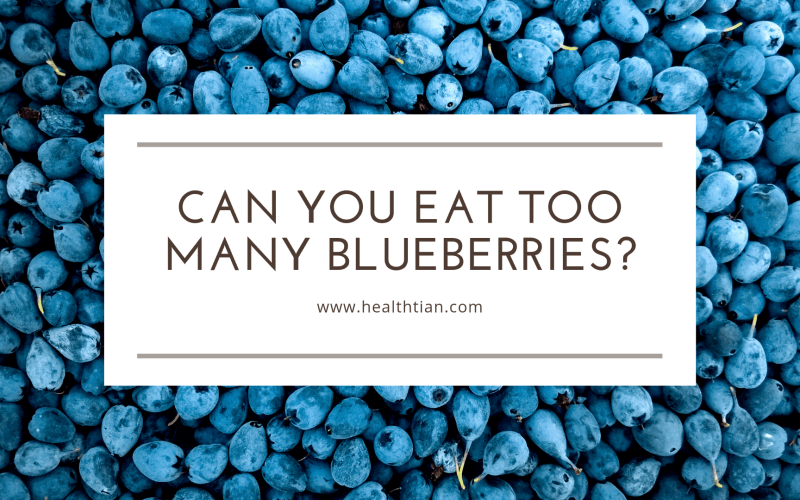Whenever the discussion of superfruits arise, there is a 70% chance that the delicious Blueberries(Cyanococcus) will find a place for itself. I mean, this fruit is known to be wonderful when it comes to skincare, weight loss, heart health, and even brain health.
Even though blueberries are native to South America, they are now found in other parts of the world. Blueberries are an amazing source of essential vitamins and minerals, flavonoids, antioxidants, phytochemicals, dietary fibers, etc.
All of these amazing qualities is what makes blueberries the best choice of fruit if you’re looking to grow healthy hair, maintain good brain health, and get glowing skin.
Blueberries are no doubt very delicious, and you do not have to peel them or do any extra work before eating them. Once they are washed, you can begin to eat and enjoy all the amazing health benefits that they pack in them.
So, since blueberries are delicious and healthy, it just might be OK to eat them all day and not worry about overeating, right? no, there’s a limit to how much of these tiny balls you can chew on. Just as with most good things, too much of blueberries can become a bad thing.
According to the USDA recommendations, adults who are on a 2000 calories diet have to eat two servings of fruits daily. This means that a half cup of blueberries is what such an adult needs in a day.
I understand that blueberries aren’t the only thing you’ll be eating in a day, but still, it is imperative that you eat these guys in moderation. As you read further, you’ll be learning more about blueberries and the side-effects of overdosing on then or overeating them.
Side effects of eating too many blueberries

1. Too much fiber (very unhealthy)
As I mentioned in the Introduction, blueberries are a wonderful source of dietary fiber and these fibers are helpful with regulating bowel movements, relieving constipation, keeping the digestive system healthy, keeping your heart in shape, absorbing bad cholesterol, and also help with weight management.
With all these benefits of dietary fibers, it is hard to believe that having too much of these fibers can be dangerous for your health.
Consuming dietary fibers in excess can lead to stomach aches and discomforts, diarrhea, bloating, and other gastrointestinal problems. It can also meddle with the absorption of nutrients by your intestines and cause many other illnesses.
To avoid the risks associated with eating too much fiber, you have to eat your blueberries in moderation.
2. May increase bleeding
If you have any medical conditions that require you to take medications like warfarin or even anti-platelet drugs like clopidogrel, then you need to think twice about adding blueberries in your diet.
While it’s on to eat blueberries once in a while and in small quantity, you have to know that this fruit has two components that play completely opposite roles on blood clotting. First of the components is Vitamin K and it helps with blood clotting. The second component is salicylates which increase blood thinning.
A single cup of frozen or fresh blueberries contains 28 mcg vitamin K, and that is obviously not a lot, but you already know that the berries may not be the only source of K in your diet.
Also, it is very possible that the salicylates contained in blueberries can compensate for the mentioned blood-clotting effect of the vitamin K which will then increase the effect of the medicines you are taking.
But then, which effect will become predominant after you eat blueberries also depends on the other foods that are part of your diet and also, the dosage of your medication.
This is why it is crucial that you find out from your doctor what the ideal portion size of blueberries that will not interfere with the drugs in your specific dosage, or whether you have to avoid them completely.
3. Blueberries can cause Salicylate sensitivity
I mentioned above that blueberries contain a high amount of vitamin K and salicylates. This compound called Salicylate is an active ingredient that is used in the creation of aspirin ( a popular synthesized medication that is used for providing relief from aches, inflammation, fever, etc.).
Salicylate is a compound that is naturally found in various plants and offers tons of health benefits. However, it may not be all well and good for the people who are sensitive to the salicylates compound.
If you or anyone you know is allergic to salicylates, it is essential that you or that person stays away from blueberries ( this is because blueberries contain salicylate in high amount) because it may cause reactions like headaches, rashes and gastrointestinal symptoms such as nausea, acid reflux, vomiting, constipation, bloating, gas, and diarrhea.
So individuals who have been confirmed to be allergic to salicylates must do all that it takes to avoid consuming fresh or frozen blueberries as well as blueberries juice.
It is however very funny that the pain and discomfort that is associated with salicylates ingestion can be calmed to a reasonable extent by eating a few balls of blueberries.
However, it is best that an allergic person does not take the risk at all and avoid blueberries completely no matter how tempting ( in case of salicylate allergy ).
4. Blueberries can cause hyperglycemia
Blueberry leaves are medicinal and have been used as supplements to diabetic medicine. However, the leaves and seeds have a significant effect on the reduction of blood sugar levels to a dangerously low level and also increase insulin sensitivity.
The reduction in blood sugar levels leads to a condition known as hypoglycemia. The symptoms of hypoglycemia include sudden nervousness, headaches, pale skin, dizziness, sudden mood swings, blurred vision, trouble thinking or concentrating, sweating, hunger, and even shaking.
This can be very dangerous for diabetics who are on medications because whenever they eat blueberries, they put themselves at risk of further lowering their blood sugar levels beyond what is considered normal.
If you are diabetic, it is advisable that you completely avoid blueberries or talk to your doctor about the right quantity to consume.
5. Blueberries are not good for people with stone fruit allergy
Judging from a general perspective, there are not many identified allergenic factors that are associated with eating blueberries and these tiny tasty berries are well tolerated by most people.
What this means is that most healthy people can consume blueberries without having to worry about getting allergic reactions.
However, for people who are generally allergic to stone fruits ( like plums, apricots, cherries, nectarines, peaches, etc) may also be sensitive to blueberries. Blueberries are no doubt, irresistible.
Nevertheless, if you want to enjoy a taste of this fruit every once in a while for the rest of your life, then you must not overeat them.
I hope you find this article helpful, and I’ll also love to read your comments. Please leave a comment below.









Thank you for being so formative in this article. I normally eat blue berries along with some greek yogurt for breakfast every morning. I have been trying to limit my Carbs and eat very lean and healthy. I was eating two boiled eggs for breakfast but that increased my Cholesterol so that’s why I resulted to greek yogurt and fresh fruit. I will watch out and see if has had any effect on me. Again, thank you!